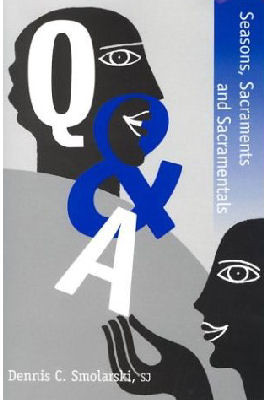
|
Posted October 1, 2006
Book: Seasons, Sacraments and Sacramentals Author: Dennis C. Smolarski, SJ Liturgical Training Publications, Chicago, IL. 2003. Pp. 125 An Excerpt from the Jacket:
What are the requirements to be a godparent? Should candidates choose a confirmation name other than th name they were given at baptism? Who should be in the wedding procession? Can a deacon assisting at a wedding Mass witness the vows? These and more questions — 40 in all — that priests, liturgists, music directors, liturgy committees, ministry coordinators, and diocesan liturgy offices frequently ask about the seasons of the church year, the celebrating of the sacraments, praying devotions and using sacramentals – are answered here with legal expertise and pastoral sensitivity by Reverend Dennis Smolarski, SJ. An Excerpt from the Book: Is a eulogy ever permitted at a funeral? Both the 2002 General Instruction of the Roman Missal and the introduction to the Order of Christian Funerals mention that at a funeral there may be a brief homily “but never a eulogy.” The Latin is secluso tamen quovis genere laudationis funebris. Questions have been raised as to whether this is a blanket prohibition against any eulogy, or if it only means that a eulogy can never replace the homily. Considering that various national editions of the OCF permit a friend or relative to “speak in remembrance” of the deceased either at the end of the vigil or before the final commendation, it is obvious that the intent of this directive is not to prohibit any reference to the deceased during the three stations of the Christian funeral. Rather, the intent seems to be to prohibit a certain style of rhetoric during a formal address to those assembled. In particular, the rubrics prohibit someone from omitting the proclamation of the gospel message of Christ’s death and resurrection – the core of any homily — and replacing it with a eulogy focusing exclusively on the achievements of the deceased. In the way that it’s used in the rubrics, the term eulogy (laudatio funebris, “funeral praise”) seems to prefer to a speech of “good words” (from the Greek eulogia, meaning praise, blessing or flattery) that does not refer to the gospel and, in common usage, praises the deceased, often ignoring any human weaknesses. To the extent that a speech of this form ignores the religious context in which it is being delivered, as well as the reality of human weakness and God’s mercy, it is inappropriate at liturgy. Yet this prohibition does not mean that there should be no reference to the deceased for whom we are praying. (Sample homilies for ordinations specifically have the bishop speak to those to be ordained, and rubrics in the rites of marriage and of religious profession state that the presider should adapt his words to the particular circumstances.) If the presidential prayers, including the eucharistic prayer, permit references to the deceased by name, certainly the funeral homily mayh also refer to the one who is now joined to Christ’ resurrection. It is an understatement to suggest that the time of death and the various funeral rites are emotionally charged moments. Family members are often dealing with grief and guilt as well as financial and legal worries all at the same time. In addition, the death may have been unexpected and traumatic. Family and friends often want to proclaim their admiration for a beloved relative or friend and may even think that it is demanded by social customs that someone “give a eulogy” during one of the funeral services. In response to this, the OCF does explicitly permit someone to “speak in remembrance” at the vigil or even before the final commendation. But his is not a required part of the liturgy and should be understood in the context of the prohibition against the homily being replaced by a eulogy. Table of Contents: The Seasons Baptism and Confirmation Marriage Penance Anointing of the sick Funerals Blessings Devotions Architecture and furnishings |
|
